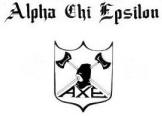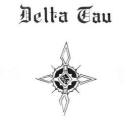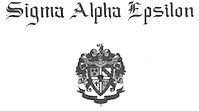|
FRATERNITY HISTORY 1969 - 1979 Indiana University of Pennsylvania
In August of 1969—the Summer of Love—hordes of young people flocked to Yasgur’s farm in Woodstock, New York, all wishing to participate in a unique cultural event, one having repercussions felt well into the future. That event, however, was preceded by another groundbreaking event, this one occurring on the main campus of Indiana University of Pennsylvania (IUP) in the spring of that year when a group of students in an apartment house on Nixon Avenue, most of them having moved there the previous semester from the IUP branch campuses of Punxsutawney and Kittanning, formed the Alpha Chi Epsilon fraternity (ΑΧΕ). The founding members were: Clint Page, Gary Walro, Mike Ferraccio, James O’Shersky, Larry Weary, Rodney Spence, Paul Kellar, Dan Harmon, Augie Hoffman, Guido Formaini, Rex Critchfield, John Zamperini, Tom Scott, Roland Snyder, James Mellish, and Peter Larioni, who became the fraternity’s first president. The insignia they chose to represent their brotherhood, along with its colors of silver and black, was based loosely on the logo of the Oakland Raiders football team, a favorite of the founding brothers. ΑΧΕ eventually established itself at 240 South 11th Street, a house that would serve as headquarters and home throughout the many incarnations of the fraternity name. Right from the start, ΑΧΕ adopted rituals used by other fraternities on campus (mainly Sigma Alpha Epsilon, the Animal House of its day, eventually disbanded for nailing closed the doors and windows of its house during a sorority mixer). These rituals included the tradition of pledge hazing, engaging in practices that would get a fraternity thrown off campus these days, not to mention thrown in jail. Some of these practices included the forced ingestion of “meatloaf” made with dog food, sucking lard from the end of a coat hanger, abandonment in a distant town, and, of course, paddling, inflicted harshly with large wooden paddles. After the fall of 1969, ΑΧΕ petitioned for membership in the national fraternity of Sigma Pi (ΣΠ), something bestowed on them in the spring of 1970. The newly installed ΣΠ colony at IUP then held an “All Sigma Pi Softball Tournament” in 1971, but things turned bad when the brothers were “robbed blind” by those staying at the house during the tournament, namely, the ΣΠ brothers from Slippery Rock University. The IUP ΣΠ colony—the former ΑΧΕ fraternity—then reverted back to ΑΧΕ in the fall of 1971 following that incident. The ΑΧΕ fraternity then remained a local organization up until the spring of 1975 when, faced with a decline in membership, the fraternity reorganized as Delta Tau (ΔΤ), bringing in unaffiliated students to increase their numbers. The new roster of founding ΔΤ members included: Robert Friedman, Steve Miladinovich, Thomas Lower, Dave Hodge, Robert McDevitt, Donald Cortese, James Ellermeyer, Richard Erneu, Brad Davis, Andrew Isar, Robert Wheatall, Kevin Higgins, William Nagy, Mark Farabaugh, Richard Gagliardo, Brad Cramer, Ernest Huey, Robert Wunderlich, Joseph Waltenbaugh, Gary Polasky, George Vanovich, Alan Salamon, Paul Sopko, Don Kemerer, and Joseph Kirby, who became the first ΔΤ president. With a full complement of members, the fraternity, once again, had a chance to grow and prosper. Despite having had a bad experience in their first attempt to nationalize, the brothers still had a desire to affiliate with a national fraternity. That was the main reason for abandoning the ΑΧΕ name and assuming a new moniker—ΔΤ—along with a new insignia, designed and drawn by Steve Miladinovich. Right from the start, they planned to petition the Delta Tau Delta (ΔΤΔ) national fraternity for membership. They believed that by announcing their desire to achieve national status with ΔΤΔ, they would attract more pledges; thereby, increasing their membership rolls and guaranteeing their long-term survival. Additionally, they recognized that by assuming a new name, one that already included two of the three Greek letters of ΔΤΔ; they would just have to add an additional “Delta” to the end of the name once they became affiliated. They believed that it would also help maintain their fraternal identity throughout the transition process. In the end, however, things did not go as planned. Before the members of ΔΤ could petition ΔΤΔ, another local fraternity, Chi Alpha Sigma (ΧΑΣ), beat them to it. The newly designated ΔΤΔ chapter then asked the local ΔΤ fraternity to change its name, to which the members of ΔΤ politely replied, “See Olga!” (if you know what that means). The ΔΤ fraternity then continued on its own trajectory, existing as a local fraternity, doing many of the things fraternities do: annoying their neighbors with drinking, loud music, and “head” volleyball games in the front yard; holding campus-wide Thursday night house parties with drinking and carousing; getting arrested for running a speakeasy and illegally selling alcohol at their Thursday night house parties; launching the “bomb”—a WWII artillery shell “acquired” by the old ΑΧΕ brothers—down the staircase on a regular basis; and wondering where the old ΑΧΕ brothers “found” the wooden coffin in which many a brother awakened the next morning, dazed and confused after a long night of heavy drinking. And, through it all, the brothers never lost their desire to achieve national fraternity status. The push to affiliate with a national fraternity again took hold in the fall of 1976 when he brothers began searching for the best organization, considering many but finally settling on two: Sigma Alpha Epsilon (ΣΑΕ) and a smaller national fraternity headquartered at Penn State, its name now forgotten. There were two competing views among the brothers. One group advocated for ΣΑΕ, finding the formality and reach of the larger fraternity desirable, looking ahead with the hope of using fraternal connections to enhance their future job prospects. This group was composed mainly of the newer and younger brothers. The opposing group—the older brothers—favored the smaller national fraternity from Penn State, stating that its relaxed, carefree management style was more in tune with the mood of ΔΤ and the former ΑΧΕ fraternities, especially after the fraternity’s national president visited the house and injured himself while sliding down the banister in a drunken stupor, striking his head on the beer machine at the bottom of the stairs. The campaign over the selection of a national fraternity was mildly contentious, but, in the end, ΣΑΕ won by a slim margin, the younger brothers outnumbering the older ones at that point. As a result, the fraternity became a ΣΑΕ colony in the spring of 1977. Right from the start, ΣΑΕ tried to leverage its influence, suggesting that the new colony replace its officers because they had been among the anti-ΣΑΕ contingent. However, where a majority of the brothers had failed to heed the advice of their officers regarding the selection of a national fraternity, they were still loyal to their officers, unwilling to throw them out of office. As a result, the officers completed their terms, turning over the reins to new leadership at the next election. It was quite ironic, though, that the fraternity then elected a president who had been staunchly anti-ΣΑΕ during the selection process, which, in some way, may have contributed to the eventual downfall of the fraternity. The national governing body of ΣΑΕ was adamant about record keeping, discipline, and rules, along with all the reports and deadlines that go hand-in-hand with such a management style, something that was anathema to the old ΔΤ fraternity. At this point, it is unknown whether or not the administrative mandates had anything to do with the failed ΣΑΕ experiment, or if the fraternity’s woes sprung from unexpected circumstances, such as losing the lease on the house, which would have deprived them of a central headquarters and a place from which to function. It also could have been the same problem faced by ΑΧΕ years earlier, dwindling membership rolls due to an inability to attract new pledges. At this point, that question remains unanswered. The last person living in the house in 1979 told a story of being in his room one day when he heard a noise near the front door. Upon going out to investigate, he discovered the front door open and all the fraternity composites missing from the walls of the charter room. Shortly after that, he moved out, bringing to an end ten years of fraternal presence in the ΑΧΕ - ΣΠ - ΔΤ - ΣΑΕ House at 240 South 11th Street. As a footnote, it should be mentioned that late in 1979 or early in 1980, several members of the former ΔΤ and ΣΑΕ fraternities received letters asking for donations. The letters came from a fraternity claiming to have arisen from the ashes of ΣΑΕ, a fraternity calling itself "ATO" (Alpha Tau Omega - ΑΤΩ). To the best of anyone’s knowledge, no brother ever donated to the new fraternity, and the issue was quickly forgotten. At some point, between 1985 and 1989, a former ΔΤ/ΣΑΕ brother, someone who had received one of the letters, was passing through Indiana on a business trip and decided to stop at the ΑΤΩ house, a nondescript home in the vicinity of Sprowls and Foster Halls. Knowing the story of the missing fraternity composites, he asked if they were the ones who had taken the pictures, his only wish to see them again and ensure that they had found a good home. He also mentioned having received one of the fundraising letters, but the ΑΤΩ brothers were suspicious of him, and none of them would admit to anything, claiming ignorance about the fraternity composites and any fraternity named Alpha Chi Epsilon, Sigma Pi, Delta Tau, or Sigma Alpha Epsilon. Sensing that he was getting nowhere in the conversation, he cut short his visit and left them in peace. At first, it was not known if ΑΤΩ continued to have a presence on the IUP campus, existing as a local fraternity, or if it had gone the way of ΑΧΕ, ΣΠ, ΔΤ, and ΣΑΕ. There was also speculation that it might have morphed into a lasting national fraternity, surviving to this day, thereby achieving something that had eluded its predecessors for ten years, but, alas, that was not to be the case. Like its various incarnations before it, ΑΤΩ closed its chapter in the spring of 2003, finally bringing to an end the fraternal experiment that began fourteen years earlier in the spring of 1969.
|


